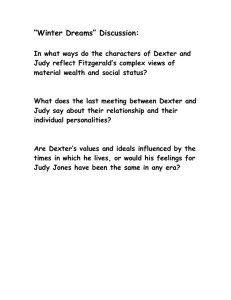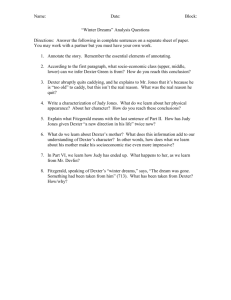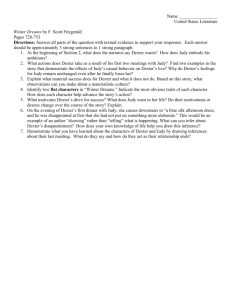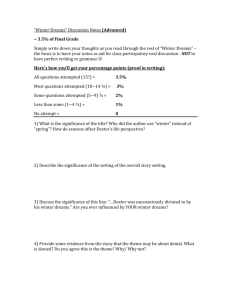Chris Nguyen - Rhetoric and Composition Portfolio
advertisement
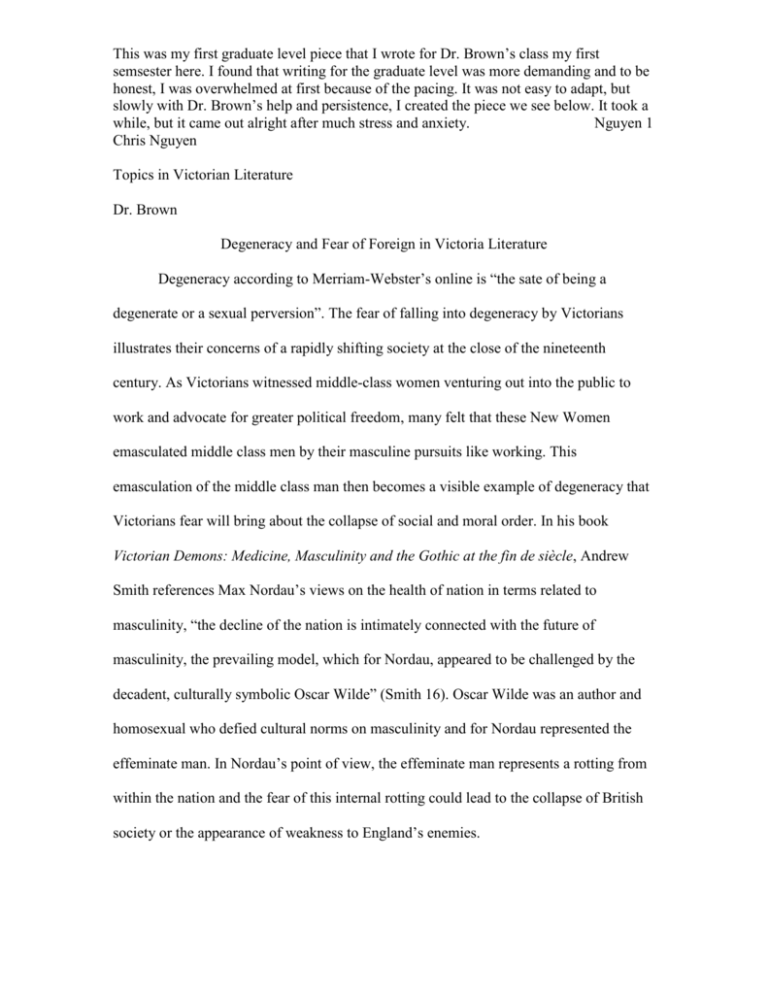
This was my first graduate level piece that I wrote for Dr. Brown’s class my first semsester here. I found that writing for the graduate level was more demanding and to be honest, I was overwhelmed at first because of the pacing. It was not easy to adapt, but slowly with Dr. Brown’s help and persistence, I created the piece we see below. It took a while, but it came out alright after much stress and anxiety. Nguyen 1 Chris Nguyen Topics in Victorian Literature Dr. Brown Degeneracy and Fear of Foreign in Victoria Literature Degeneracy according to Merriam-Webster’s online is “the sate of being a degenerate or a sexual perversion”. The fear of falling into degeneracy by Victorians illustrates their concerns of a rapidly shifting society at the close of the nineteenth century. As Victorians witnessed middle-class women venturing out into the public to work and advocate for greater political freedom, many felt that these New Women emasculated middle class men by their masculine pursuits like working. This emasculation of the middle class man then becomes a visible example of degeneracy that Victorians fear will bring about the collapse of social and moral order. In his book Victorian Demons: Medicine, Masculinity and the Gothic at the fin de siècle, Andrew Smith references Max Nordau’s views on the health of nation in terms related to masculinity, “the decline of the nation is intimately connected with the future of masculinity, the prevailing model, which for Nordau, appeared to be challenged by the decadent, culturally symbolic Oscar Wilde” (Smith 16). Oscar Wilde was an author and homosexual who defied cultural norms on masculinity and for Nordau represented the effeminate man. In Nordau’s point of view, the effeminate man represents a rotting from within the nation and the fear of this internal rotting could lead to the collapse of British society or the appearance of weakness to England’s enemies. This was my first graduate level piece that I wrote for Dr. Brown’s class my first semsester here. I found that writing for the graduate level was more demanding and to be honest, I was overwhelmed at first because of the pacing. It was not easy to adapt, but slowly with Dr. Brown’s help and persistence, I created the piece we see below. It took a while, but it came out alright after much stress and anxiety. Nguyen 2 England during the Victorian era had a vast colonial empire stretching from India to Egypt to Jamaica which gave England immense wealth and resource. England’s ability to maintain order in this empire depended on England’s military strength and its colonists presenting a united view of British superiority to the native people in the colonies. Any perceived weakness of England by England’s enemies due to signs of degeneration or decay invites war between England and its colonial rivals. These developments were not missed by Victorian authors and many examples of degeneracy were featured in books written during this period of change. The asexual monster that appears in The Beetle that mesmerizes and bends men to its will represents an example of degeneracy. The character of Miserrimus Dexter, with his deformity and animalistic behavior in The Law and the Lady is another example of degeneracy in the Victorian novel. The degeneracy of these characters represents the Victorian fears of society sliding further into moral and social decay, so using close analysis from select passages of The Beetle and The Law and the Lady I will demonstrate how this fear of degeneracy represented a fear of foreign influence in British society. The character of the Beetle that Marsh describes as “-- a creature born neither of God nor man” (322) gives the creature a demonic connotation from first impressions. When something is born from neither God nor men, then it is considered unnatural. If the Beetle then is unnatural in origin, then it can be conclusive that the creature possesses unusual abilities or is grotesque in appearance which adds to its demonic aura. This connotation is reinforced with the Beetle’s transformation from beetle to human form witnessed by Atherton in his lab: This was my first graduate level piece that I wrote for Dr. Brown’s class my first semsester here. I found that writing for the graduate level was more demanding and to be honest, I was overwhelmed at first because of the pacing. It was not easy to adapt, but slowly with Dr. Brown’s help and persistence, I created the piece we see below. It took a while, but it came out alright after much stress and anxiety. Nguyen 3 […] that beetle swelled and swelled, until it had assumed its former portentous dimensions, when, as it seemed, it was enveloped by a human shape, and in less time than no time, there stood in front of me, naked from top to toe, my truly versatile oriental friend. One startling fact nudity revealed, -- that I had been egregiously mistaken on the question of sex. My visitor was not a man, but a woman, […] (Marsh 152) From this passage, the reader sees using Atherton’s eyes the transformation of the Beetle. What makes this transformation sequence puzzling is that the transformation itself is stretched out by Marsh into a lengthy, descriptive process where a short sequence could have sufficed. This deliberate lengthy elaboration of the transformation process mirrors the Beetle’s own transformation into human form in which it “swells and swells”, until it reaches human size. By mirroring the Beetle’s transformation with a lengthy description of the process, Marsh adds an element of suspense and mystery to the scene giving it a more ominous and darker atmosphere that Atherton’s lab already provides. Use of imagination by the reader gives Atherton’s lab the aura of a mad scientist’s laboratory filled with containers of poisonous gases which Atherton gleefully exclaims, “I had in front of me some of the finest destructive agents you could wish light upon— carbon-monoxide, chlorine-trioxide, mercuricoxide, potassium-carboxide, cyanogens” (Marsh 102). This laboratory already possesses a sinister atmosphere from Atherton’s deadly foray into experimental weapons, but the appearance of the Beetle and its transformation from beetle form to human adds to the mysterious and fantastic aspects in the Gothic tradition (my emphasis). All of these aspects emphasize the setting, but since This was my first graduate level piece that I wrote for Dr. Brown’s class my first semsester here. I found that writing for the graduate level was more demanding and to be honest, I was overwhelmed at first because of the pacing. It was not easy to adapt, but slowly with Dr. Brown’s help and persistence, I created the piece we see below. It took a while, but it came out alright after much stress and anxiety. Nguyen 4 the emphasis is on the Beetle itself, then Atherton’s shock at the creature’s sex is a good indication about the Beetle’s otherness. The Beetle then becomes something that defies classification according to Victorian standards and Darwinian classifications. It is an “other” in the Victorian view due to its asexual quality. Worse of all, due to the description by Atherton that the Beetle is “oriental” means it is a foreigner that infiltrates England in order to exact revenge against a prominent British politician. I say the creature is foreign here due to the description of the beetle as “Oriental” or “Arab” by Atherton and later the creature’s pursuers representing British order and stability. Since the Beetle originates from Egypt, then it’s infiltration of England represents the Victorian fear of reverse colonization by one of their colonies through the influx of goods and people. Egypt was a protectorate of the Ottoman Empire according to Deane (381) and that the relationship between Egypt and Britain, and Europe in general, was strained due to strong nationalist sentiment in Egypt calling for independence from European influence by Egypt’s war minister Ahmed Urabi (392). Britain’s foray into Egypt stemmed from the Urabi uprising, but colonialist arguments that Egypt was ignorant about civilized culture and behavior also played a role in British intervention. According to Edward Said, “But at the outset one can say that so far as the West was concerned during the nineteenth and twentieth centuries, an assumption had been made that the Orient and everything in it was, if not patently inferior to, then in need of corrective study by the West” (41-42). The argument about how the Orient was “inferior” to Western culture or government becomes a critique the backwardness Orient culture and how guidance from the West will lead the Orient into prosperity and civility. This was my first graduate level piece that I wrote for Dr. Brown’s class my first semsester here. I found that writing for the graduate level was more demanding and to be honest, I was overwhelmed at first because of the pacing. It was not easy to adapt, but slowly with Dr. Brown’s help and persistence, I created the piece we see below. It took a while, but it came out alright after much stress and anxiety. Nguyen 5 Edward Said also references author James Balfour logic on why British intervention is necessary in the Egypt experiment, “England knows Egypt; Egypt is what England knows; England knows that Egypt cannot have self-government; England confirms that by occupying Egypt; for the Egyptians, Egypt is what England has occupied and now governs; foreign occupation therefore becomes ‘the very basis’ of contemporary Egyptian civilization; Egypt requires, indeed insists upon, British occupation” (34) This further reinforcement of the colonialist argument succeeds in convincing the English government into sending troops into Egypt under the public guise of protecting European influence and Egypt’s historical treasures, but the ulterior motive was an effort to educate Egypt about the virtues of civilized law as Bradley Deane argues: Since the presence of British scholars in Egypt was authorized by the high-minded ideals of protecting and studying vulnerable antiquities, the moment those relics were pronounced safe and well catalogued would be the moment that the British would be forced to cede to the Egyptians the custody of their own history (389) In this instance, England prolongs its presence in Egypt through the study and cataloguing of Egyptian relics and antiquities. Though British scholars studied these antiquities in Egypt, their eventual exportation back to English museums leads to bitter feelings among the Egyptian people due to the stealing of Egypt’s cultural past by the British. Acknowledgment that Britain had accomplished its aim in protecting Egyptian history and bringing Egypt towards enlightenment would spell the end of British involvement in Egypt. Egypt consequently returns to Ottoman protection and Britain This was my first graduate level piece that I wrote for Dr. Brown’s class my first semsester here. I found that writing for the graduate level was more demanding and to be honest, I was overwhelmed at first because of the pacing. It was not easy to adapt, but slowly with Dr. Brown’s help and persistence, I created the piece we see below. It took a while, but it came out alright after much stress and anxiety. Nguyen 6 loses a vital sea port for trade with the rest of its empire, so naturally Britain is hesitant to leave such an attractive outpost. All of these factors combine into creating the often tense relationship between Britain and Egypt, which oscillates for Britain between fascination and awe of Egypt and revulsion and fear of Egypt’s otherness. The coming of the Beetle into Britain then becomes the personified fear of invasion by foreign influence that strips away British culture and replaces it with an unknown, uncivilized culture according to the Victorians. This fear of outside influence with its degenerate ways of thinking and influence is something that Johannes Burger touches on in his article “Max Nordau, Madison Grant and the Racialized Theories of Ideology”. In Burger’s article, he references the writings of Nordau, in which Madison Grant uses a century later, in order to better understand the xenophobic nature of outside influences during the 19th century: In short, Degeneration was an aesthetic analysis of most of the major literary movements and schools in the late nineteenth century, most notably naturalism, symbolism, decadentism, and mysticism. He saw the literature produced by these movements as a sign of widespread degeneracy during the fin-de-sie`cle. (Burgers 121) The foreign ideas creating new literary movements that strayed from previous classical movements become signs of contamination from foreigners living in England and the native peoples in the colonies. British colonists kept a safe distance from the native people lest contact with these foreign bodies and their ideas represent contamination upon the body of British citizens. This contamination of the body of British citizens from This was my first graduate level piece that I wrote for Dr. Brown’s class my first semsester here. I found that writing for the graduate level was more demanding and to be honest, I was overwhelmed at first because of the pacing. It was not easy to adapt, but slowly with Dr. Brown’s help and persistence, I created the piece we see below. It took a while, but it came out alright after much stress and anxiety. Nguyen 7 foreign influence then represents contamination of the larger body of British society. British society was struggling to contain the contamination from foreign influences and ideas emanating from its foreign workers living in Britain. The result of this contamination from foreign ideas or influences then results in moral and social sickness much like how the body becomes weak and sickly from disease. The only possible remedy for this form of “sickness” is the quarantining of the foreigners to the poorer areas around London to stop the spread of their deadly influence. Based on the actions of the Beetle so far in Marsh’s work, the contamination that the Beetle spreads threatens to destabilize British society. The Beetle has already infiltrated British society by using an out of work clerk as its puppet to commit various crimes. The Beetle bends the clerk, a man to its will, and then forcibly rapes the clerk. Now the idea of a man being raped is already scandalous in that as Smith noted earlier on the connection between masculinity and the health of the nation. The clerk is an example an effeminate or weak man due to his emasculation by the Beetle and therefore indicates that society is growing sick. Now, the emphasis on the man in question is that he is a clerk and an out or work clerk at that. The clerk named Robert Holt is only a member of the working class, so society at large is still protected from the infection of the Beetle’s contamination. If the Beetle manages to bend a member of the upper class or someone in apposition of power in British society, then the prognosis for societal health is very grim. The Beetle does bend a politician to its will when the politician was in Egypt. Paul Lessingham, the politician in question, was held captive by the Beetle when it took on human form in the guise of a beautiful and alluring woman. Lessingham calls “her” the “woman of the songs” (Marsh 251). The This was my first graduate level piece that I wrote for Dr. Brown’s class my first semsester here. I found that writing for the graduate level was more demanding and to be honest, I was overwhelmed at first because of the pacing. It was not easy to adapt, but slowly with Dr. Brown’s help and persistence, I created the piece we see below. It took a while, but it came out alright after much stress and anxiety. Nguyen 8 Beetle’s disguise as a woman makes it into something that Europeans in general are more accustomed to when dealing with the other. As a beautiful enchantress, the Beetle becomes exotic and sexual, making “her” dangerous to European ideals like control or civility. The Beetle demonstrates an ability to control men much a siren from The Odyssey. “She” uses her songs to draw in Lessingham and once in her grasp, Lessingham is powerless then to resist “her” as he notes, “Those eyes of hers! They were the devil’s. I can positively affirm that they had on me a diabolical effect. They robbed me of my consciousness, of my power of volition, of my capacity to think, -- they made me wax in her hands” (Marsh 240). The Victorian view of masculinity for the middle class man meant that the man had to be strong. By Lessingham comparing himself as wax; weak, subtle and easy to mold, it demonstrates the Beetle’s monstrous ability to emasculate strong men. The Beetle’s mesmerizing eyes robbed Lessingham of his will consequently making him a slave to the Beetle’s will, reaffirming its demonic nature. Lessingham’s contact with the foreign, unknown other or the Beetle then contaminates Lessingham to the Beetle’s foreign influence and almost effaces Lessingham from his British identity as he says, “For days altogether I was speechless, and could remember nothing,--not even my own name” (Marsh 246). The effacement that Paul Lessingham faces then represents the consequences of contact with foreign influences and confirms Victorian fears about foreigners and their ideas. The Beetle then is monstrous due to its foreignness due to its origins in Egypt and how it can emasculate men by bending them to its will. All of those monstrous qualities of the Beetle therefore make it an example of degeneracy. This was my first graduate level piece that I wrote for Dr. Brown’s class my first semsester here. I found that writing for the graduate level was more demanding and to be honest, I was overwhelmed at first because of the pacing. It was not easy to adapt, but slowly with Dr. Brown’s help and persistence, I created the piece we see below. It took a while, but it came out alright after much stress and anxiety. Nguyen 9 Now that examination on how the Beetle represents degeneracy to the Victorian audience, let’s examine the character of Messimerius Dexter and how his appearance and actions make him into an example of degeneracy. The character of Dexter in The Law and the Lady by Willkie Collins is to say the least a very disturbing character. The main character Valeria finds that the man she marries is under suspicion of killing his first wife. Since the prosecution does not have enough evidence to prove Valeria’s husband did kill his first wife, the just gives Valeria’s husband the verdict of “Not Proven” (Collins 80). This verdict makes Valeria’s husband shameful because the verdict always casts doubt on his innocence. Valeria resolves to prove her husband’s innocence and tracks down witnesses to the crime. In her search for witnesses, Valeria comes across the character of Messimerius Dexter. The first impression of Dexter is a very negative one in how the main character Valeria describes Dexter, “For one moment we saw a head and body in the air, absolutely deprived of the lower limbs. The moment after, the terrible creature touched the floor as lightly as a monkey, on his hands” (Collins 139). The sight of someone like Dexter already fills Valeria with dread. The description of Dexter as only a “head and body” without the lower half of his body emasculates Dexter in the sense that he cannot ever procreate and produce progeny. Dexter already is then the “other” not in the sense that he is foreign, but rather because Dexter is fully emasculated as a man. His lack of the lower half of his body castrates him and because of this deformity he unlikely has any relationship with women. He is more creature than man from Valeria’s description of how Dexter lands on his hands as “lightly as a monkey”. This was my first graduate level piece that I wrote for Dr. Brown’s class my first semsester here. I found that writing for the graduate level was more demanding and to be honest, I was overwhelmed at first because of the pacing. It was not easy to adapt, but slowly with Dr. Brown’s help and persistence, I created the piece we see below. It took a while, but it came out alright after much stress and anxiety. Nguyen 10 In fact, because of his deformity or the unfavorable first impression Valeria has of Dexter, she keeps describing Dexter in animalistic terms for example comparing Dexter’s hearing to those of a dog’s (Collins 140). This constant devolution of Dexter by Valeria then makes Dexter out as a primitive being rather than a human being. Dexter then becomes savage in the eyes of the Victorian audience and susceptible to degenerate tendencies. Commenting on this concept Christopher Clausen in his article “From the Mountain to the Monsters”, writes about the primitive aspects of Mr. Hyde in Robert Louis Stephenson’s The Strange Case of Dr. Jekyll and Mr. Hyde and how Hyde is more creature than man, “Hyde is a primitive creature, less evolved than mixed humanity, dominated by an "ape-like fury," "ape-like tricks," "ape-like spite"; described by a witness as looking "like a monkey" (244). This description of Hyde’s actions and appearance parallels Dexter’s actions and appearance. Dexter’s deformity forces Dexter to “walk” around on his hands with animal like agility and flexibility. Valeria description of Dexter’s landing on his hands “like a monkey” only reinforces this concept about Dexter as animal like rather than human. Hyde represents a regression in human nature, a return to the primitive and savage nature that Victorians feel they have surpassed through the enlightenment of civility and order. Hyde’s regression represents then the chaotic and degenerate inclination that threatens to destroy society if society succumbs to degeneracy. Dexter can be seen as a form of regression as well due to his animalistic behavior and his madness which will be discussed later. Dexter’s classification as subhuman or primitive stem from his inability to perform the functions of a normal man. Dexter’s emasculation leads him to further “other” himself by his acquiring of feminine past times like cooking: This was my first graduate level piece that I wrote for Dr. Brown’s class my first semsester here. I found that writing for the graduate level was more demanding and to be honest, I was overwhelmed at first because of the pacing. It was not easy to adapt, but slowly with Dr. Brown’s help and persistence, I created the piece we see below. It took a while, but it came out alright after much stress and anxiety. Nguyen 11 I am going to cook,’ he announced, with the most engaging simplicity. ‘We both stand in need of refreshment before we return to the serious business of our interview. You see me in my cook's dress; forgive it. There is a form in these things. I am a great stickler for forms. I have been taking some wine. Please sanction that proceeding by taking some wine too" (Collins 164) Dexter cooking for himself is not the usual past time of a normal Victorian middle class man. Where a normal Victorian middle class man goes hunting or horseback riding, Dexter physically cannot do any of those activities. Dexter looks to Valeria to validate his existence because of his marginalization in society by having her taste his cooking. His obsession with forms possibly stems from how he views his body, but the most interesting piece from this dialogue is how he refers to the cook’s uniform. Dexter refers to the outfit as a dress further validates Dexter’s emasculation caused by his deformity. Dexter’s deformity coupled with his abnormal behavior to the Victorian audience become the physical manifestations of his degeneracy, but Dexter’s degeneracy stems from his madness. Madness in a character for the Victorians was a sign of degeneracy and forsehadow the character’s spiral into criminality. Dexter’s mental degeneracy revolves primarily around his obsessions with the wives of his friend Eustace Macallan or the delight he takes in torturing his cousin Ariel: At the word of command, Ariel submissively stretched out one arm toward the dish. Just as she touched a cake with the tips of her fingers her hand was jerked away by a pull at the string, so savagely cruel in the nimble and This was my first graduate level piece that I wrote for Dr. Brown’s class my first semsester here. I found that writing for the graduate level was more demanding and to be honest, I was overwhelmed at first because of the pacing. It was not easy to adapt, but slowly with Dr. Brown’s help and persistence, I created the piece we see below. It took a while, but it came out alright after much stress and anxiety. Nguyen 12 devilish violence of it that I felt inclined to snatch Benjamin's cane out of his hand and break it over Messimerius Dexter's back. Ariel suffered the pain this time in Spartan silence (Collins 218). The mental degeneracy the Dexter demonstrates his regression from civilized humanity into primitive savagery. He enjoys inflicting pain on the submissive Ariel and views the torture as a way to pass the time before Valeria returns. If Dexter’s deformity were not enough reason for his marginalization in society, the activities that he enjoys will be sufficient grounds for his marginalization. However, no one has seen Dexter indulge in these activities before until Valeria goes to interview Dexter for details about the death of her husband’s first wife. Dexter kept his vile desires and gratifications secret from the public, therefore following in the Gothic tradition of doubling in which Dexter creates essentially a private self that is hidden away from the public. As Nils Clausen notes in his article “Culture and Corruption: Paterian Self-Development versus Gothic Degeneration in Oscar Wilde’s The Picture of Dorian Grey”, “Gothic provided a space wherein to explore phenomena at the border of human identity and culture—insanity, criminality, barbarity, sexual perversion” (354). Dexter’s actions here are at the edge of human behavior. Dexter’s behaviors and actions are those of a deeply disturbed individual who succumbs to madness and enjoys it. He knowingly inflicts pain on Ariel and this willful infliction and enjoyment of pain makes Dexter savage, showing the regression of his mind into the realm of the primitive being. Dexter’s insanity along with his deformity already sets him apart from the normal middle-class man in society, but his apparent delight in torturing Ariel only further demonstrates his degeneracy. I have previously This was my first graduate level piece that I wrote for Dr. Brown’s class my first semsester here. I found that writing for the graduate level was more demanding and to be honest, I was overwhelmed at first because of the pacing. It was not easy to adapt, but slowly with Dr. Brown’s help and persistence, I created the piece we see below. It took a while, but it came out alright after much stress and anxiety. Nguyen 13 stated that Dexter’s mental degeneracy stems from both his delight in torturing his cousin Ariel and his obsession with Eustace’s wives. In the novel, the reader discovers the reason why Eustace’s (Valeria’s husband) first wife Sara dies from poisoning. Eustace’s first wife Sara commits suicide from a combination of a loveless marriage with Eustace and Dexter’s obsession with her. Sara is fully devoted to Eustace and rebuffs Dexter’s advances towards her by writing: Well, Mr. Dexter has been your guest for many weeks; and Mr. Dexter has dared to speak to me again of his love. He has insulted me, and insulted you, by declaring that he adores me and that you hate me. He has promised me a life of unalloyed happiness, in a foreign country with my lover; and he has prophesied for me a life of unendurable misery at home with my husband. (Collins 259) Dexter’s obsession first with Sara and then Valeria is very disturbing. In the passage Sara comments on how Dexter once more reaffirms his love for her and disregarding that she is now a married woman. Here Dexter is disregarding not only Sara’s status, but also the authority of Sara’s husband Eustace. Dexter is staying as a guest of Eustace and yet Dexter is trying to covet Eustace’s wife, indicating that Dexter does not acknowledge Eustace as Sara’s husband. Dexter’s behavior is not only rude but extremely disrespectful and his obsession for Sara only grows stronger the longer he is a guest under Eustace’s roof. Dexter uses various manipulative methods to claim Sara for his own, from charming Sara with promises of “alloying happiness in a foreign country” with him to constantly insulting Eustace in an effort to convince Sara that Eustace does not love her. This was my first graduate level piece that I wrote for Dr. Brown’s class my first semsester here. I found that writing for the graduate level was more demanding and to be honest, I was overwhelmed at first because of the pacing. It was not easy to adapt, but slowly with Dr. Brown’s help and persistence, I created the piece we see below. It took a while, but it came out alright after much stress and anxiety. Nguyen 14 Sara resists Dexter’s advances until Dexter convinces her that he can obtain the proof that Eustace does not love her from Eustace’s diary. Sarah reads Eustace’s diary and resolves to die in order to prove her love for Eustace one last time by writing "Oh, my husband, I have done the deed which will relieve you of the wife whom you hate!” (Collins 262) Sara could not bear the thought that Eustace did not love her and that Dexter was right, so she hopes that her death made her “more lovable in [his] eyes” (Collins 262). Sara also hopes that her final rebuff of Dexter’s affections will cause Dexter to suffer (Collins 263). Dexter loses his object of affection that he obsessed over and he tries to keep Eustace from implication in the matter out of the ounce of humanity he possesses. Dexter’s degeneracy stemming from his madness and the deformity of his body then makes him a monstrous character and an example of degeneracy in Victorian literature. Dexter differences significantly in some attributes and is similar to the character of the Beetle in other characteristics. First of all, Dexter is a domestic representation of degeneracy in Victorian literature. He lives in Glenndich, Scotland and not in a colony in the East. The Beetle differs from Dexter in that the Beetle is a foreign creature originating in Egypt. The Beetle thus represents the attempt of the colonized to invade England and spread their foreign influences and ideas in an effort to efface British culture, much like how the British effaced many native cultures in their colonies. Unlike Dexter, whose degeneracy is targeted towards women, the Beetle’s degeneracy is targeted predominantly towards men. For example, the Beetle tried to hypnotize Atherton and bend him to its will as Atherton notes, “For the moment I was astonished to the verge This was my first graduate level piece that I wrote for Dr. Brown’s class my first semsester here. I found that writing for the graduate level was more demanding and to be honest, I was overwhelmed at first because of the pacing. It was not easy to adapt, but slowly with Dr. Brown’s help and persistence, I created the piece we see below. It took a while, but it came out alright after much stress and anxiety. Nguyen 15 of stupefaction. The sensation was peculiar. I was incapable of advancing another inch in his direction as if I had lost the use of my limbs,” (Marsh 144). The hypnotic suggestion of the creature’s eyes is another difference between Dexter and the Beetle. Dexter uses his voice and actions to ensnare his intended victim, while the Beetle uses its eyes to mesmerize and then ensnare its victims. Unfortunately for the Beetle though, Atherton successfully resists its mesmerizing eyes and learns more about the creature’s motives in London. The appearances for both Dexter and the Beetle also serve as another way in which they differ. Dexter’s physical appearance grants him some beauty compared to the Beetle as Valeria notes, “I saw plainly now the bright intelligent face and the large clear blue eyes, the lustrous waving hair of a light chestnut color, the long delicate white hands, and the magnificent throat and chest which I have elsewhere described” (Collins 143). This description of Dexter in spite of his deformity gives him as previously stated beauty and also an indication of good health. The description of the Beetle in contrast with its “saffron yellow” complexion and “mass of wrinkles” in its skin (Marsh 53) gives it an impression of sickness. Maybe the reason for the two differing descriptions stem from once more the fact that Dexter is domestic, while the foreign Beetle comes from outside. The outside influence then is given the more negative description due to its otherness and foreign origins. In listing the ways that Dexter and the Beetle are different, I am attempting to illustrate the Victorian fear of outside influences is directly linked to the fear of falling into degeneracy as a result of outside influences. Now that the differences between the characters have been discussed, the focus can be made on how they are both alike. This was my first graduate level piece that I wrote for Dr. Brown’s class my first semsester here. I found that writing for the graduate level was more demanding and to be honest, I was overwhelmed at first because of the pacing. It was not easy to adapt, but slowly with Dr. Brown’s help and persistence, I created the piece we see below. It took a while, but it came out alright after much stress and anxiety. Nguyen 16 The main similarity between the Beetle and Dexter is that they are both considered degenerates by their actions. Their perversions are on the edge of acceptable sexual practices of the times, mainly the homosexual acts that the androgynous Beetle inflicts upon its male victims and the sadistic pleasure from inflicting pain by Dexter. In terms of physical appearances, both have some peculiar deformities in that Dexter is missing the lower half of his body and the Beetle has unusually large eyes. Both the Beetle and Dexter share in the role of master in the master-slave relationship and both forcibly try to bend their victims to their wills. Though the reasons for why the Beetle and Dexter are considered degenerates are different, both are united under the term degenerate for their rejection of the civilized order of British society. They are both “othered” in society and therefore their behavior does not follow the boundaries of societal norms. In many ways the Beetle and Dexter classification due to their unusual characteristics, Dexter because of his deformity would not be considered a man in Victorian society, but he cannot be pushed into the category of woman either. He exists somewhere in the middle of those two categories due to the description of his features and his actions. The Beetle does not fit into classification either as male or female due to the androgynous nature of the creature. The shape-shifting ability that the Beetle possesses allows it to take any form it chooses between man, woman or insect. Victorians at the end of the 19th century worried about the future of British society due to the rapidly changing cultural and social landscape. Middle class men and women were breaking with the cultural norms of their gender roles, and an influx of foreign goods and people into England added to the social chaos. Many Victorians feared that This was my first graduate level piece that I wrote for Dr. Brown’s class my first semsester here. I found that writing for the graduate level was more demanding and to be honest, I was overwhelmed at first because of the pacing. It was not easy to adapt, but slowly with Dr. Brown’s help and persistence, I created the piece we see below. It took a while, but it came out alright after much stress and anxiety. Nguyen 17 these changes were a sign of degeneracy that would topple British society and the order it represented. The character of Messimerius Dexter and the Beetle represented the forms of degeneracy present in Victorian novels. Dexter with his deformity becomes the effeminate man and represents a weakening of masculinity. The Beetle in contrast represented the foreign influence that Victorians fear will try to replace British culture and turn it into something unknown or “other”. Both characters become the representation of how Victorians feared degeneracy stemming from foreign influence. This was my first graduate level piece that I wrote for Dr. Brown’s class my first semsester here. I found that writing for the graduate level was more demanding and to be honest, I was overwhelmed at first because of the pacing. It was not easy to adapt, but slowly with Dr. Brown’s help and persistence, I created the piece we see below. It took a while, but it came out alright after much stress and anxiety. Nguyen 18 Works Cited Burgers, Johannes Hendrikus. "Max Nordau, Madison Grant, And Racialized Theories Of Ideology." Journal Of The History Of Ideas72.1 (2011): 119-140. MLA International Bibliography. Web. 2 Dec. 2012. Collins, Wilkie. The Law and the Lady. New York: Penguin Press, 2007. Print. Clausen, Christopher. "From The Mountain To The Monsters." Sewanee Review 115.2 (2007): 239-250. MLA International Bibliography. Web. 11 Dec. 2012. Clausson, Nils. "'Culture And Corruption': Paterian Self-Development Versus Gothic Degeneration In Oscar Wilde's The Picture Of Dorian Gray." Papers On Language And Literature: A Journal For Scholars And Critics Of Language And Literature 39.4 (2003): 339-364.MLA International Bibliography. Web. 2 Dec. 2012. Deane, Bradley. "Mummy Fiction And The Occupation Of Egypt: Imperial Striptease." English Literature In Transition 1880-1920 51.4 (2008): 381410. MLA International Bibliography. Web. 11 Dec. 2012. Marsh, Richard. The Beetle. Toronto: Broadview, 2004. Print. Said, Edward. Orientalism. London: Penguin, 1977. Print. Smith, Andrew. “Degeneration, masculinity, nationhood and the Gothic.” Victorian Demons: Medicine, masculinity and the Gothic at the fin de siècle. Manchester: Manchester University Press, 2004. 15-42. Print. This was my first graduate level piece that I wrote for Dr. Brown’s class my first semsester here. I found that writing for the graduate level was more demanding and to be honest, I was overwhelmed at first because of the pacing. It was not easy to adapt, but slowly with Dr. Brown’s help and persistence, I created the piece we see below. It took a while, but it came out alright after much stress and anxiety. Nguyen 19
